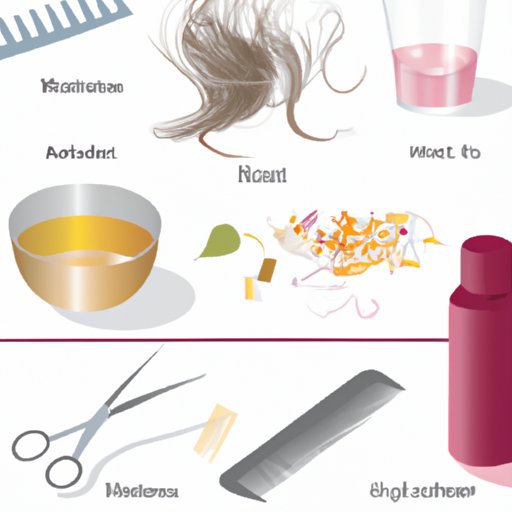Introduction
Growing long hair can be a challenge for many people, but it doesn’t have to be. With the right tips and techniques, you can achieve the length and volume you’ve always wanted. In this article, you’ll learn how to grow your hair longer by eating a healthy diet, taking hair supplements, reducing stress levels, using low-heat styling tools, avoiding overwashing, and trimming split ends regularly.
Eating a Healthy Diet
Eating a healthy diet is essential for promoting hair growth. Not only does it provide your body with the necessary nutrients to keep your hair healthy, but it also helps to support a healthy lifestyle overall. Foods that are rich in vitamins, minerals, and other essential nutrients are especially beneficial for hair growth. Good sources of these nutrients include fruits and vegetables, nuts and seeds, whole grains, lean proteins, and healthy fats.
Including foods like spinach, salmon, eggs, avocados, yogurt, and sweet potatoes in your diet can help boost hair growth. These foods are rich in vitamins, minerals, and other essential nutrients that are essential for healthy hair. Additionally, they contain omega-3 fatty acids, which are known to promote hair growth and prevent hair loss. On the other hand, foods that are high in sugar, refined carbs, and unhealthy fats should be avoided as much as possible, as they can hinder hair growth.
Taking Hair Supplements
Hair supplements can be a great way to give your hair an extra boost. There are many different types of supplements on the market, including those that are specifically formulated for hair growth. These supplements typically contain ingredients like biotin, vitamin B complex, silica, and collagen, which are all important for promoting healthy hair growth. It’s important to note that while hair supplements can be beneficial, they should not be relied upon as a sole source of nutrition.
When taking hair supplements, it’s important to follow the instructions carefully and not exceed the recommended dosage. Additionally, it’s important to talk to your doctor before starting any new supplement, as some may interact with medications or have potential side effects.
Reducing Stress Levels
Stress can have a major impact on hair growth, so it’s important to try to reduce your stress levels as much as possible. The best way to do this is to practice stress-reduction techniques such as yoga, meditation, and deep breathing. Additionally, getting enough sleep, exercising regularly, and spending time doing things you enjoy can also help to reduce stress levels.
It’s also important to manage your workload and make sure you don’t take on too much at once. If you find yourself feeling overwhelmed, it can be helpful to break down your tasks into smaller chunks and focus on one thing at a time. Additionally, talking to a mental health professional can be beneficial if you’re struggling to manage your stress levels.
Using Low-Heat Styling Tools
High-heat styling tools, such as curling irons and flat irons, can damage your hair and make it more prone to breakage. To minimize heat damage, opt for low-heat styling tools instead. These tools use less heat, so they’re gentler on your hair and won’t cause as much damage. Examples of low-heat styling tools include ceramic brushes, tourmaline curlers, and ionic dryers.
When using any type of styling tool, it’s important to use a heat protectant product to help shield your hair from the heat. Additionally, it’s best to limit your use of heat styling tools to no more than twice a week. This will help to ensure that your hair remains healthy and strong.
Avoiding Overwashing Hair
Overwashing your hair can strip it of its natural oils, making it more prone to breakage. Therefore, it’s best to wash your hair no more than two to three times a week. Additionally, when you do wash your hair, use a mild shampoo and conditioner that are specifically designed for your hair type.
If you find yourself needing to wash your hair more often, there are alternatives to overwashing. Dry shampoo can be used to absorb excess oil and refresh your scalp without having to use water. Additionally, using a leave-in conditioner can help to keep your hair looking and feeling clean between washes.
Trimming Split Ends Regularly
Split ends can make your hair look dull and unhealthy. To prevent split ends, it’s important to trim your hair regularly. How often you need to trim your hair depends on your hair type and the amount of damage it has sustained. Generally speaking, most people should get their split ends trimmed every six to eight weeks.
When trimming your hair, it’s important to use sharp scissors and be careful not to cut too much off. Additionally, it’s best to let a professional stylist handle your trim, as they have the experience and expertise needed to get the job done right.
Conclusion
Growing longer hair doesn’t have to be a struggle. By following the tips outlined in this article – eating a healthy diet, taking hair supplements, reducing stress levels, using low-heat styling tools, avoiding overwashing, and trimming split ends regularly – you can achieve the length and volume you’ve always wanted. With a little patience and dedication, you’ll be well on your way to achieving your hair goals.


